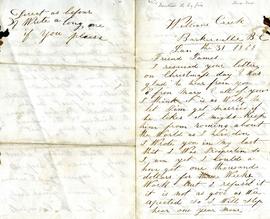This file consists of copies of two manuscript items relating to the history of the Oblates in Northern British Columbia; the third item is a copy of the transcription and translation of one of these accounts. Includes:
- A copy of a type-written unpublished account possibly written c. 1922 entitled "Indian Schools of Fort St. James and Fraser Lake, B.C." The account is written by Father Elphage Allard, OMI on the founding of the residential school at Fort St. James and later of the building of the residential school at Lejac, near Fraser Lake, BC. Allard refers to his, and his younger siblings', also named Father Allard, involvement in the building of the residential schools at Fort St. James in 1916-1917 and subsequently at Fraser Lake ca. 1920-1922. Father Allard provides a detailed account of daily life and spiritual work conducted by the Oblates at the schools including daily routines of the First Nations students, dormitory life, educational curriculum, religious education, and arrival of a group of the Sisters of the Infant Jesus Congregation to assist at the school. The account provides descriptions of the 1918 flu epidemic and deaths that occurred among communities at Fort St. James, Pinchi, Tachi, Fraser Lake and Lake Porteur; involvement of the Anglo-Europeans in the construction of the schools; and interactions with the Chinese cook and Indian Agent in the communities. The manuscript also provides brief account of Allard's journey to provide religious services to other First Nations communities including Fort Graham, McLeod Lake, Atlin and Whitehorse. Both Father Allards were subsequently dismissed from involvement in the Fraser Lake School in 1922.
- A copy of a handwritten account by Father Jean-Marie Lejeune entitled "Comment la Sténographie a été introduite dez les sauvages" written by Lejeune at the Indian Missionary, Kamloops, B.C. c.1890-93 in which he describes his introduction of the shorthand in British Columbia to First Nations in the Kamloops region and the subsequent publication of the newsletter entitled Kamloops Wawa.
- A transcription and translation of Father Lejeune's account by William Poser with annotations.
